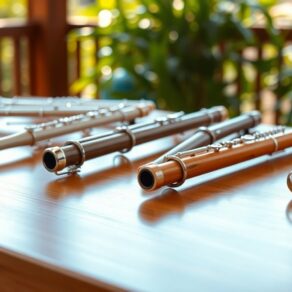Choosing your ideal flute isn't just about picking an instrument; it's a personalized journey. Start by determining your skill level, as beginners should lean towards durable materials like nickel-silver, while advanced players may seek features like open holes. Explore different types, including concert and alto flutes, to match your musical style. Material choice matters; metal offers brightness, while wood can produce warmth. Evaluate size and weight for comfort during practice sessions. Finally, always test play flutes to guarantee they feel right. Your perfect flute awaits, and there's more to discover about making a choice you'll love.
Key Takeaways
- Determine your skill level to choose between beginner-friendly materials like nickel-silver or advanced options with features like open holes for flexibility.
- Consider the type of flute that suits your musical style, such as concert, piccolo, alto, or bass flute.
- Test play different flutes to assess comfort, sound quality, and response to breath control before making a purchase.
- Factor in size, weight, and portability; select a flute that feels comfortable for long practice sessions and easy transport.
- Set a budget based on your skill level, considering entry-level options for beginners and professional flutes for advanced players.
Determine Your Skill Level
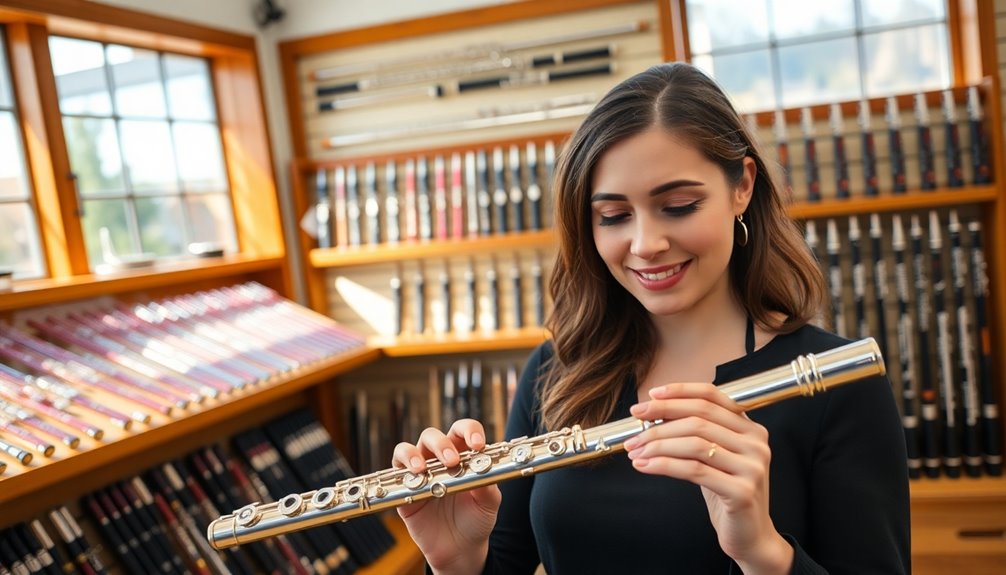
When choosing your ideal flute, the first step is to determine your skill level, which can greatly influence your selection. If you're a beginner, you'll want to focus on flutes that are straightforward and easy to play.
Beginner tips include looking for instruments made from durable materials, such as nickel-silver, which can withstand the wear and tear of learning. These flutes usually have simpler mechanisms, making them perfect for developing your foundational techniques without overwhelming you.
As you advance, your needs will evolve. You might find yourself seeking flutes with advanced features like open holes, which allow for greater tonal flexibility and expression. These flutes often come with additional keys or mechanisms that can enhance your playing experience but may require more skill to navigate.
Acknowledging your current skill level helps you avoid the frustration of using a flute that's either too basic or too complex for your abilities.
Don't forget to think about how each flute feels in your hands. A comfortable grip can greatly affect your performance, especially as you tackle more challenging pieces.
Remember, it's okay to seek guidance from instructors or fellow musicians—they can provide insights tailored to your specific skill set.
Ultimately, selecting the right flute is a personal journey. Embrace where you are, and know that this choice can propel you to new heights in your musical adventure.
Trust yourself, and enjoy the process of finding an instrument that resonates with your unique style and aspirations.
Explore Different Flute Types
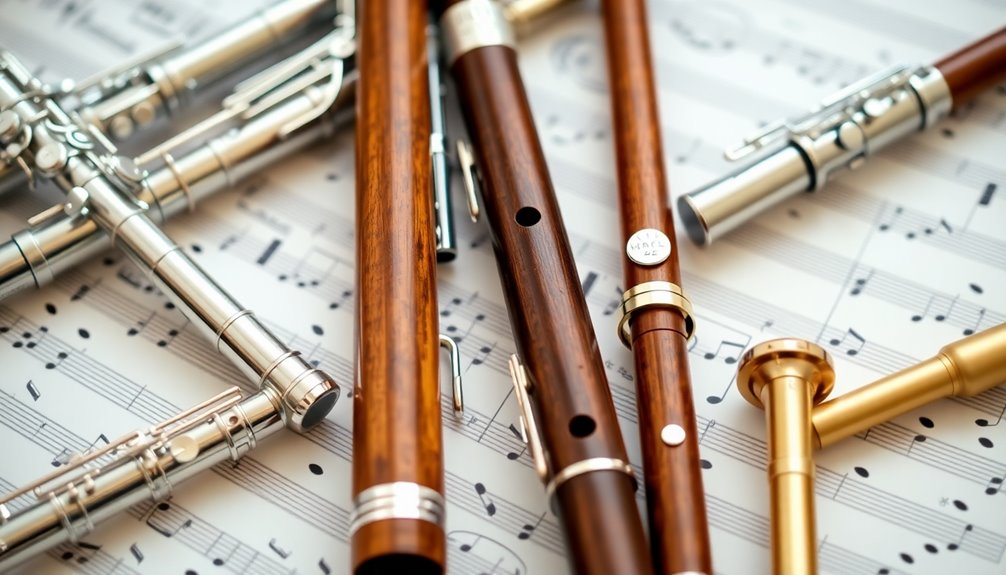
Flutes come in various types, each offering unique characteristics that can greatly impact your playing experience. Understanding these differences is essential, especially when you're deciding between beginner flutes and advanced flutes.
If you're just starting out, beginner flutes are designed with your needs in mind. These instruments typically feature a simpler design, making them easier to play and more forgiving as you learn the ropes. Look for a flute with a sturdy construction and a responsive mechanism; this will help you develop your skills without becoming frustrated.
Some beginner flutes even come with features like offset G keys, which can make finger positioning more comfortable. Additionally, consider choosing a beginner flute from a reputable brand like Yamaha, known for quality and affordability.
As you gain experience, you might want to explore advanced flutes. These instruments often boast superior craftsmanship, offering enhanced tonal quality and greater versatility. Advanced flutes may include options like open holes, which require more precise finger placement but provide a richer sound.
You might also find that these flutes offer a wider range of materials and finishes, allowing you to personalize your instrument as you hone your artistry.
Ultimately, exploring different flute types allows you to find a model that resonates with your musical aspirations. Don't hesitate to try out several flutes; each one can evoke different feelings and sounds.
Consider Material Choices
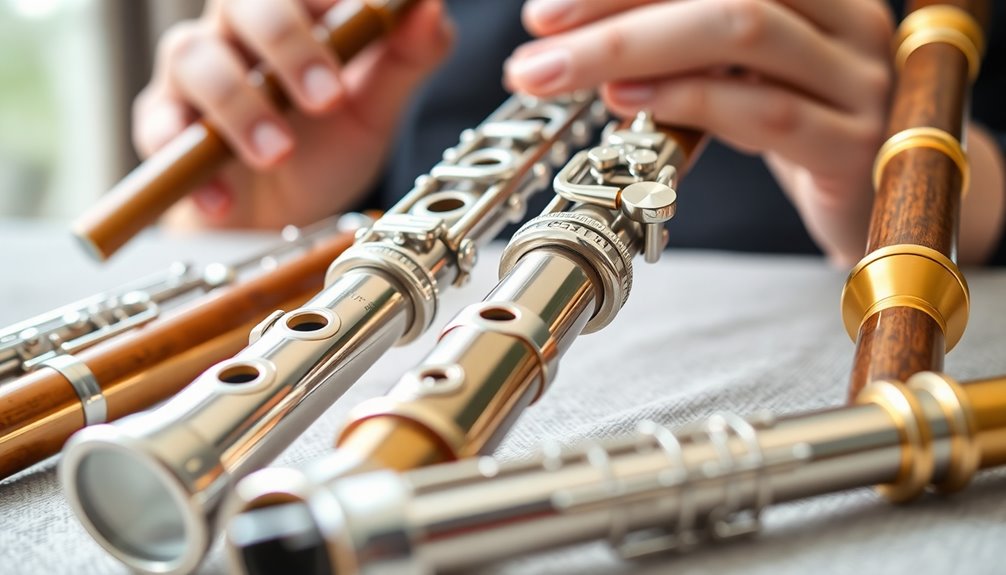
As you investigate the various flute types, material choices become a significant factor that can influence your sound and playing experience. Understanding the differences between wood and metal flutes is vital, especially if you're a beginner.
Each material offers unique tonal qualities and playing characteristics that can shape your musical journey.
When considering the best flute for you, think about the following factors:
- Sound Quality: Wood flutes generally provide a warmer, richer tone, while metal flutes offer a brighter, more focused sound.
- Weight and Feel: Metal flutes tend to be heavier, which can affect comfort during extended play. Consider how this impacts your playing style.
- Maintenance: Wood flutes may require more upkeep, such as regular oiling, while metal flutes are often easier to maintain.
- Price Range: Beginner materials can vary widely in cost, so it's important to find something that fits your budget without compromising quality.
- Performance Needs: Think about the music genres you want to explore. Some styles may benefit from the unique sound characteristics of wood or metal.
Ultimately, you want a flute that resonates with your personal style and needs. Additionally, consider that regular maintenance is essential for prolonging the lifespan of wooden flutes and ensuring better performance.
Don't hesitate to experiment with different materials before making a decision. Whether you choose a wood or metal flute, trust that each option has something valuable to offer as you begin your musical journey.
Your ideal flute is out there, waiting for you to discover its potential!
Evaluate Flute Size and Weight
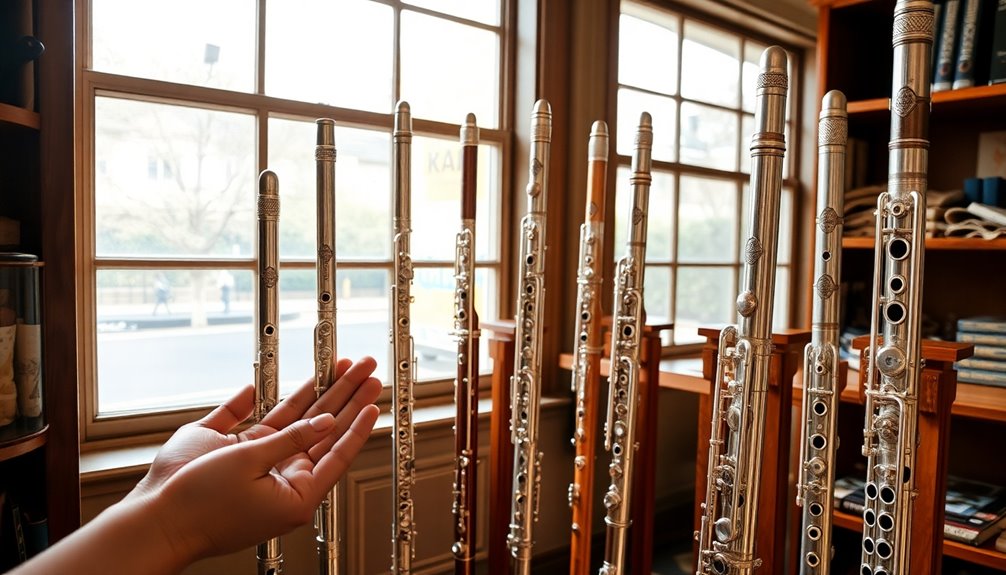
Selecting the right size and weight for your flute can greatly impact your comfort and overall playing experience. When considering flute ergonomics, think about how the dimensions and heft of the instrument will affect your ability to hold and maneuver it during practice and performances. A flute that feels too heavy or large can lead to fatigue and frustration, ultimately diminishing your enjoyment and progress.
It's vital to evaluate your physical attributes as well. If you have smaller hands, a lighter flute with a more compact design might be more suitable. Conversely, if you're taller or have larger hands, you may find a full-sized flute more comfortable. Comfort should be your priority; a well-fitted instrument encourages longer practice sessions without strain.
Instrument portability is another important factor. If you plan on transporting your flute frequently, consider how weight and size will play into your daily routine. A lightweight model might be ideal for students who need to carry their instrument to school or rehearsals.
As you explore your options, don't hesitate to ask for help from instructors or fellow musicians. They can provide valuable insights based on their own experiences. Additionally, choosing a flute from a reputable brand like Yamaha Flutes can ensure a quality design that complements your playing style and physical needs.
Test Play Before Buying

When considering a flute purchase, test playing the instrument is essential for ensuring it matches your personal preferences and playing style. A well-informed decision often comes from firsthand experience.
When you're in a test environment, pay close attention to how the flute responds to your playing. Here are some key aspects to focus on during your test play:
- Comfort: How does the flute feel in your hands? Are the keys easy to reach?
- Tone Quality: Listen to the sound. Does it align with your sound preferences?
- Response: Does the flute respond well to your breath control and technique?
- Intonation: Play different notes and check for pitch accuracy. Is it in tune across the range?
- Weight and Balance: Does it feel balanced when you play, or does it feel cumbersome?
These elements can greatly influence your playing experience. Additionally, consider the sound quality that varies significantly between models, as it can impact your overall satisfaction with the instrument.
It's also helpful to try the flute in various styles, from classical to contemporary, to see if it meets your diverse needs. If possible, bring a friend or teacher along for a second opinion—they can provide valuable insights.
Frequently Asked Questions
What Is the Average Lifespan of a Flute?
The average lifespan of a flute can range from 10 to 50 years, depending on the materials used and how well you maintain it.
Silver and gold flutes tend to last longer with proper care.
Regular cleaning and avoiding extreme temperatures can help extend your flute's life.
How Often Should I Clean My Flute?
Think of your flute as a delicate garden; it thrives with care. You should clean your flute after every playing session to keep it blooming beautifully.
For deeper maintenance, consider a thorough cleaning once a month. These cleaning frequencies are essential maintenance tips that help prevent buildup and preserve your instrument's tone.
Can I Customize My Flute's Appearance?
Absolutely, you can customize your flute's appearance! Many manufacturers offer various customization options, allowing you to choose finishes, engravings, and even key colors.
These aesthetic enhancements can truly reflect your personality and style, making your instrument feel uniquely yours.
Don't hesitate to explore these possibilities; personalizing your flute not only enhances its visual appeal but also helps you feel more connected to your music.
Embrace the chance to express yourself through your instrument!
What Brands Are Considered the Best for Beginners?
Imagine standing at the edge of a beautiful forest, ready to explore.
When it comes to choosing a flute, Yamaha flutes are like sturdy trees, offering reliability and ease for beginners. Gemeinhardt flutes, on the other hand, represent the gentle stream, flowing smoothly and encouraging you to learn.
Both brands provide quality instruments that help you feel at home within the music community. Choose one, and let your musical journey begin!
Is It Necessary to Buy a New Flute?
It isn't necessary to buy a new flute; used flutes can be a great option. Many beginner players find that well-maintained used instruments perform just as well as new ones.
Just make certain you check for any necessary flute maintenance, like pads or springs. By opting for a used flute, you not only save money but also join a community that values sustainability and shared musical journeys.
You'll feel right at home with this choice!
Conclusion
Choosing your ideal flute might seem straightforward, but it's a bit like finding a needle in a haystack—if that needle could play beautiful melodies. By evaluating your skill level, exploring flute types, considering materials, and appraising size, you'll narrow down your options. And don't forget to test play! Embracing this process not only guarantees you find the perfect instrument but also deepens your connection to music. After all, the right flute won't just play notes; it'll inspire your passion.




